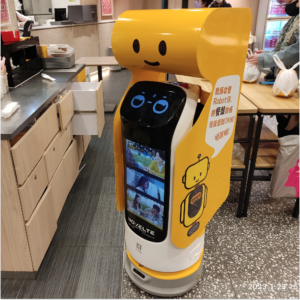15 year-old Anastasia Kulikova on the phenomenon of ‘dying jobs’ in the age of tech advancement

January 23, 2023. Robotic machine in Cafe de Coral Restaurant in Hong Kong.
October 10, 2024
Dying jobs - will AI shape the future of employment?
Due to the rapid development of technology, especially artificial intelligence (AI), jobs are swiftly disappearing. Over the last few years, some traditional jobs have gone for good. Supermarket cashiers have already been replaced by self-service checkouts, while many assembly line workers have been replaced by cheaper, more efficient, automated machinery.
But some jobs will continue to remain essential. “Medical workers, and even teachers, will probably be relevant for a long time. We saw this a lot during Covid, with online schooling being not very successful, especially with younger students,” said Jeremy Li, an ex-finance expert who now teaches business studies in a high school in Sydney.
A recent International Monetary Fund (IMF) study says that AI will trigger potentially profound changes in many jobs and sectors. At the same time as improving productivity, AI is poised to increase both income and wealth inequality, especially in advanced economies.
But emerging markets and developing economies, often still reliant on manual labour and traditional industries, may initially face fewer AI-induced disruptions. Some jobs, like those of customer service workers, will still be carried out by humans due to the essential element of face-to-face contact. But many will not be necessary.
We shouldn’t trust AI in courts - Here’s why
Anna Znamenskaya, chief marketing officer for a leading food delivery company in Asia and recently a career coach, says, “The companies don’t want to spend a lot of money on hiring people for routine operations. Robots and new technologies will help with that problem as they advance, become popular, then even cheaper than the salaries of real people. This would allow companies to reduce the number of workers.”
Most professions that are disappearing don’t require a lot of critical thinking, and are in service sectors or administrative support. Accountants, translators (with increased usage of software like Google Translate) could be replaced with AI. ChatGPT and similar software can do designs faster and easier than humans, so graphic designers will be needed less.
Jobs that don't require qualifications are disappearing the most, so it is important to be qualified. For people with little or no experience or education, it will be harder to find the right job
Jeremy Li, high school business studies teacher in Sydney
Although, even if an industry is shrinking, there is potential for human success. For jobs high up in many industries, human labour and insight will still be required for the foreseeable future.
Znamenskaya recommends that young people properly research their career paths, “so that by the time they finish university, their skills will still be needed and they have no risks of being unoccupied later.”
“Jobs that don’t require qualifications are disappearing the most, so it is important to be qualified. For people with little or no experience or education, it will be harder to find the right job,” says Li.
“If someone’s current job is about to disappear, they will have to retrain, perhaps for a whole new profession in a different industry,” Li advises, adding that people should prepare for change by studying and learning to be more versatile.
In some cases, it is more complicated to switch to another profession, as skills can be very specialised. A subway train driver in Russia believes that his job will be in demand for a long time in his country, but agrees that it will not be easy for him to find another job without retraining.
For others, it could be easier. A supermarket cashier, who works part-time in downtown Sydney, still thinks that automated machines will not take over from staff. But, in the event that machines do take over, she is confident that “it won’t be hard for me to find a job, as skills that I use for this job can be useful in many others.”
Ksenia Elzes, a Russian journalist based in the Netherlands who writes for Flacon magazine and the Moscow Times, says that journalism provides many transferable skills. For example, she also manages social media for Russian clothing brands, which provides valuable experience and insights into marketing. She doesn’t think her job is at risk, but just in case, she can easily bring her skills to another profession.
People whose work will disappear should look at the jobs that are the closest to the ones they have experience in, so that they don’t need to learn again and will not have to lose time.
Anna Znamenskaya advises: “The most important thing is to learn how to use those new technologies as an advantage, and then advance your job working with it.” Also, as has happened before, when some jobs become automated, other new occupations will arise. As new technologies appear, there will be jobs for someone to look after them.




